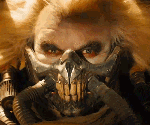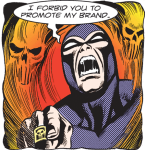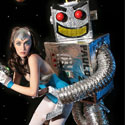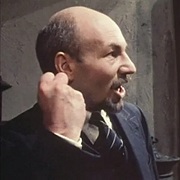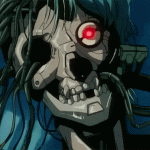|
Snak posted:So if Niander Wallace, the only unconstrained character, and also the villain, had been a woman, the film would have been more feminist? SMG defined it clearly when saying the film isn't feminist. The film would need to more directly address the socio-economic problems that the dystopia sits atop of, like unemployment, various inequalities (income, housing, presumably), labor exploitation, etc. That Wallace fades out of existence toward the end of the narrative, so one such socio-economic problem being that Wallace is allowed to exist as he does, just ends up giving way to the self-actualization of K reuniting Deckard with his daughter. So the film being feminist doesn't have anything to do with Wallace's sex or gender. There's already a black woman who is some sort of CEO or corporate figure that purchases slaves/Replicants from Love. The film already has an "inclusive" (likely unequal) dystopia. What it needs to do is address what is happening to the people who are producing goods or have no labor. It takes the time to show a drone strike on unemployed, impoverished humans since they were in the way of K's mission to reunite families. Implying there will be some sort of Replicant uprising doesn't answer questions about these things that are subordinated or out of sight in the film. What happens to the poor or the disenfranchised?
|
|
|
|

|
| # ? May 28, 2024 07:36 |
|
Haven't read the whole thread, have you guys discussed the plot point of that, in the world of Bladerunner, if replicants are to be shown to be able to reproduce, it would lead to a major societal upheaval? It's what the police chief character and the replicant rebellion leader seemed to believe. And the movie didn't in any way dissuade those notion. They both were convinced that if society finds out that replicants can have babies, which means they have souls, which means they are real people, they would be freed from slavery and given rights on par with "real" humans. Thats what it seemed to me, the movie was going for. But if thats what the movie is saying, I just don't see it happening, the world of Bladerunner being extremely nihilistic and dystopian. Why would anyone care about replicants being able to have children? People don't care about real children slaving in the garbage slums why would anyone give a poo poo about replicant children? The issue I have with this is that if that's correct it would mean that both characters of the police chief and the replicant rebellion leader are incredibly naive and misguided, almost to a point of absurdity. They are portrayed as intelligent people, who've thought quite a lot about these issues and them being this dumb about it really makes it jarring. Did I miss something?
|
|
|
|
Replicants are physically superior to human beings, and being able to reproduce independently of whatever process Wallace uses to build them would allow them a degree of freedom. Also, replicants are already people with "souls" or whatever, but their inability to reproduce is one of the few things that still allow humans to think of them as lesser beings. It wouldn't end anti-replicant sentiments, and would probably actually stoke them further. Joshi is a peacekeeper, and riots (she most likely has no reason to think that the current generation of replicants can rebel) would not be good for her.
|
|
|
|
I found the way the movie uses the word "soul" strange. Like a distinct thing that exists. And which humans possess and replicants don't. Dialog between K and the police chief where he says he doesn't have a soul, and she responds that he's been doing okay without it, felt forced. Is anyone aware on the directors religious stance? It would make sense if he believes this stuff. Monglo fucked around with this message at 13:10 on Oct 24, 2017 |
|
|
|
It just seemed like they were referring to an abstract concept to me.
|
|
|
|
GhostofJohnMuir posted:doesn't that imply that you die every time you go to sleep Are you implying that you don't?
|
|
|
|
Relevant: http://existentialcomics.com/comic/1 edit: ^ Avatar buddies!
|
|
|
|
RangerKarl posted:Hilariously this shot was censored in Malaysian cinemas so there's like a few lines of dialog I missed out on. "We make angels, -SNIP- and that is how I gave us nine new worlds." Thank gently caress for the film censor board, I coulda seen a tity if they hadn't been careful
|
|
|
|
The point of that scene is K's alienation and moral vacuum.
|
|
|
|
SMERSH Mouth posted:It would help if JOI and K never had the conversation about nucleotide vs binary encoding. It's not quite misleading, it's informative in the sense that Joi is both a product and work force - a disposable workforce. Positioning her alongside those who are simply outside. Her body is the emitter, containing sensors, data storage and so on but the one's and zero's makeup how that sensor data is perceived, stored and processed into image and sound that's seen and heard - how she's marketed and sold. Importantly it comes back to Wallace, his whole 'crack the code' problem and where he tortures Deckard. Specifically what's implied by his idea that Rachel was tailor made for him. That love was pre-packaged and sold, with the end-goal product being a child. Drawing attention to the material conditions and power relations that afford him this position of immense wealth. Where in a sense he reduces it to market-determined outcomes. Best influence I can think of here is Foucault's clinical gaze, chances are this might be off. The scene with a newborn replicant and “let's have a look at you.” Where his floating sensors essentially gaze through the body and determine that she’s a failed experiment because of a barren womb. This separation of body and person in relation to love - how Deckard saw Rachel. To the extent that he produces a 'perfect' replica of Rachel, but what Deckard fell in love with was Rachel's very imperfections. Kinda worth noting that 2049 is pulling a lot of influence from Minority Report, like the image of Sapper's cut out eye in a baggie, to memory and of course Joi. Also we do get a calibration scene with Joe in the first scene with Joi. Though the form is somewhat different, the long pause before she emerges and where she jumps from image to image "read to me" "Dance with me" etc. The true horror of 2049 isn’t that it’s dystopian, but a capitalist utopia.
|
|
|
|
GhostofJohnMuir posted:doesn't that imply that you die every time you go to sleep Consciousness is an illusion and lacks any meaningful definition.
|
|
|
|
Monglo posted:I found the way the movie uses the word "soul" strange. Like a distinct thing that exists. And which humans possess and replicants don't. In context the references to souls just seemed to represent the unquestioned assumption that Replicants must be inferior to other humans in some abstract way, despite being basically the same. As for your earlier question, if Replicants could reproduce and their children were born free of the restraints added to keep them enslaved then it would no longer matter whether regular humans thought they had souls or not.
|
|
|
|
The Big Word posted:
Salam 1 Malaysia, brader. Honestly, sometimes it feels like the Censorship Board is in cahoots with the people selling DVDs and blurays, since those remain uncensored.
|
|
|
|
they even censored the hallway full of the naked replicants in jars by giving us a low-res zoomed-in vid of K and Luv walking down the stairs. the censorship is hilariously awful
|
|
|
|
TerminalSaint posted:Are you implying that you don't? 
|
|
|
|
The MSJ posted:Salam 1 Malaysia, brader. Honestly, sometimes it feels like the Censorship Board is in cahoots with the people selling DVDs and blurays, since those remain uncensored. Thought they started allowing kissing to be shown recently. Progress!
|
|
|
|
Someone do a remake of Cinema Paradiso but in Malaysia.
|
|
|
|
Is there ever an indication that Deckard has information that might help Wallace or is Wallace just a gently caress up?
|
|
|
|
Arglebargle III posted:Is there ever an indication that Deckard has information that might help Wallace or is Wallace just a gently caress up? Freysa's fear is that Deckard will lead Wallace to her and then she could lead Wallace to Ana. He could then dissect Ana and figure it out.
|
|
|
|
The correct response: 
|
|
|
|
Wallace's monologues are the only bit of this film I thought weren't great, and I don't really blame Jared Leto, just the writing. Monologuing to Deckard is fine because it's just kind f what villains do. But earlier when he's doing it with Luv in the room or talking to a newborn replicant it's just, like... what? Do you always talk like this? Do you do this every day, just speak your motivations out loud? If it were more poetic I could take it as a kind of soliloquy but it's not so it's just a "here's my character so you know what I'm about" speech.
|
|
|
|
The Saddest Rhino posted:they even censored the hallway full of the naked replicants in jars by giving us a low-res zoomed-in vid of K and Luv walking down the stairs. the censorship is hilariously awful I deliberately avoided all news/trailers/etc before seeing it so it was especially baffling when I finally checked out the trailers a few days afterwards and saw that the offending pickled replicants shot was right loving there in one of them. You can't even see anything!
|
|
|
|
brawleh posted:Kinda worth noting that 2049 is pulling a lot of influence from Minority Report, like the image of Sapper's cut out eye in a baggie, to memory and of course Joi. I'd say even more so than the personal advertisements, JOI resembles the emitted home-movie holograms that Anderton projects when he's alone in his high-rise apartment on rainy nights. And of course Dr. Stelline invokes the precogs and their occasional forays into falsified memories. Also the merging of JOI and Mariette invokes the image of the scramble suit from Linklater's A Scanner Darkly. edit: I just found a collection of PKD's most well-known short stories/novellas. I've only read a handful of his novels- can someone recommend a couple of his best short stories?
|
|
|
|
Why is SMG unable to take PM's. that's a man you could learn something from conversing with
|
|
|
|
Marenghi posted:Why is SMG unable to take PM's. that's a man you could learn something from conversing with Just go down to your local emergency department and talk to someone coming down off of PCP instead. Same thing.
|
|
|
|
Posting is a performance art.
|
|
|
|
Finally saw this. I knew I was in for a nearly 3 hour movie but it didn't feel like it at all. My god I loved this movie. My GF hated the ending but we talked about it and she didn't hear a crucial bit of dialogue. The lady who played, uh, The Angel (?) was so perfectly creepy. Ahhhhhh!
|
|
|
|
bewilderment posted:Wallace's monologues are the only bit of this film I thought weren't great, and I don't really blame Jared Leto, just the writing. It's not really unusual to narrate your thoughts when you've been alone for a while. Wallace doesn't think of replicants as people; when he is with them, he is in his mind alone.
|
|
|
|
Inzombiac posted:Finally saw this. Ah the wonderful Luv, yes she is a great character. Jedit posted:It's not really unusual to narrate your thoughts when you've been alone for a while. Wallace doesn't think of replicants as people; when he is with them, he is in his mind alone. Replicants are like any other machine...
|
|
|
|
BarronsArtGallery posted:Just go down to your local emergency department and talk to someone coming down off of PCP instead. Same thing. Nothing like someone with Cookie Monster eyes yelling, "YOOOOOOOOOO" over and over, punctuated by cackles, to really teach you the true meaning of film.
|
|
|
|
GhostofJohnMuir posted:doesn't that imply that you die every time you go to sleep Not die per se but yeah the psychological continuity approach does run in to trouble with going to sleep.
|
|
|
|
Also I saw this movie and I really liked it. A few images that are really gonna stay with me are Luv, in the sterile room getting her nails done, calling down drone strikes, and the way that the protein farms at the beginning mirror the industrial hellscape that opened the original movie. In fact, I overall really like what someone pointed out earlier, which is that the dystopia of 2049 is like an inversion of the dystopia of 1982. Instead of the overcrowded, overstuffed industrial city, the world is now grey and blighted with the main colour being the projected, pornified advertisements. One thing I've been thinking about is how the story fits in with Villeneuve's other work, and I think there's a way where this can be taken with Arrival to represent a kind of increasing political optimism(dunno about this word, maybe relevance or pointedness is better) creeping into his movies. All of his movies revolve around personal, ethical choices, and usually centre on breaking some kind of cycle of violence. This is most pointed in Incendies, which I still think is his best to date. Both Incendies and Sicario, while taking on political subject matter, did not have their characters' decisions have real politics-changing importance. Nawal forgives the war and suffering that shaped and nearly destroyed her, and Macer chooses to let Alejandro walk away, thereby not becoming a wolf. Arrival is Villeneuve's first movie that really focuses on the political impact of the personal, ethical decisions, of the characters are shown to underlie real political outcomes. The soldiers' seal themselves off to watch Alex Jones, and this is generally taken to underlie the global march to war. Understanding and patience is needed to avert war. And so on. As for 2049, I don't really know. I wrote a few things here then deleted them because I wasn't sure of them. The one idea kicking around in my head is something like holding that K's death should be understood as something like 'if you're going to sacrifice yourself for some just end, you don't get to be around to see it'. So what K did was right, and what he did was right irrespective of whether or not the revolution succeeds. That's also why the revolution shows up then disappears and we don't get a postscript of them storming the barricades -- what matters was K's (political) decision, and so that's where Villeneuve ends his film.
|
|
|
|
Monglo posted:I found the way the movie uses the word "soul" strange. Like a distinct thing that exists. And which humans possess and replicants don't. I think Blade Runner handles soul in a more pre-modernity sense. "Soul" more like the Greek word, which we derive "psyche" from. It's more like the motivating force which life has but inert things don't. Imagine if she was telling him, "you don't have an organic personality, you're just programmed". Except you'd have to mean organic as in "born and bred", not merely as having a wet brain instead of a dry one. That's closer to Blade Runner's idea of soul. Evoking the mythology of gods and man has more to do with the power tripping of the father figures in charge of these corporations. The religious metaphor is that Old Testament God is charge of the robot corporation. More or less. When the chief says K doesn't have a soul there's a beat for K which you could interpret as "actually I do have a soul, and that was super racist of you". If you wanted to read that into it. feedmyleg posted:Consciousness is an illusion and lacks any meaningful definition. The central crux of all conversation about meaning in Blade Runner. Whatever you believe about consciousness, determines your view on the movie's themes. Monglo posted:Haven't read the whole thread, have you guys discussed the plot point of that, in the world of Bladerunner, if replicants are to be shown to be able to reproduce, it would lead to a major societal upheaval? The first movie makes it out to be more like Replicants are sold similarly to vacuum cleaners. Buy this, and it'll make your life easier. That's why life is so great in the off-world colonies. Vacuum cleaners don't disobey orders, or rebel and slay their masters. That's why we need Blade Runners, to keep that image alive. That's why a Replicant who develops feelings has to die- so they won't wake up and rebel. 2049 very explicitly talks about slavery. What would the United States be today without the Irish, Africans, Mexicans, that whole thing. Same with the off-world colonies. If Replicants entirely rely on the corporation for life, they'll never rebel en masse, because they'd realize production will stop and they'll all be Blade Runner'd eventually. The corporation is their father, and you don't rebel against your father without a good reason (such as Batty storming Eden/Heaven/Home and demanding more life). But if Replicants can give birth, they're truly equal to human beings in every way, and they can replenish their numbers. It is, as they say, on. I think the first plot works better. The real point is just that the machines would refuse to work. That would doom humanity on its own. There doesn't need to be a violent uprising. revwinnebago fucked around with this message at 17:12 on Oct 25, 2017 |
|
|
|
Hand Knit posted:One thing I've been thinking about is how the story fits in with Villeneuve's other work, and I think there's a way where this can be taken with Arrival to represent a kind of increasing political optimism(dunno about this word, maybe relevance or pointedness is better) creeping into his movies. All of his movies revolve around personal, ethical choices, and usually centre on breaking some kind of cycle of violence. I never would have thought that a director who does such great, personal, human stories could make a direct sequel to Blade Runner. In some respects I'd actually argue it's not. It's a different beast running on a similar mythos. But in a subtle way that I'm still putting together. Pretty much every subtext of the first film is remade in a subtle way, to the point that I think you could draw a line of separation and never find a real crossover. I need to see the movie again. It's so... weird... that this is such a human story where we get so deep into the characters. Yet Blade Runner had mythological figures, cardboard cutouts instantly recognizable. So I feel like the Blade Runner characters had much more mythological depth, even though I admit there's a lot more characterization in 2049. Very, very interesting and complex. Somehow, despite knowing so much more about K and who K is and K's motivations and life... I feel like I "know" Deckard better. Even though I admit Deckard is basically just smoke and mirrors, you know precious little about him.
|
|
|
|
SuperMechagodzilla posted:But this is the point where people get really confused, and say Joi must be fake. But the truth is that none of the Jois are conscious of this process. Each experiences her actions as her own autonomous behaviour, for the same reason that you are not conscious of your motivations (desires, fantasies, etc.). You believe that you have free will, despite being programmed, right? Wanted to naively explore this a little bit, chances are this will be foolish. The perception of Joi's immortality is rooted in her position as a disposable and replaceable product, through upgrades or whatever that shares an important relationship with how she's sold. Joi is presented as freedom of choice - Joi can appear as you like, say what you like, you can even have multiple Joi's etc. Where behind this lies the horror of the situation and that she's denied the basic right to say no, to consent - she has no choice. This bares relation to Joe, living as a relatively well off policeman, presenting him with certain freedoms, he can buy a car, rent an apartment and buy an eminator etc. But what lies behind this freedom of choice is his tenuous position as a disposable contract worker, should he lose the contract he will simply be 'retired' and this is something he's aware of - newer models don't run. Failing the baseline meant that, whether or not he goes on the run was never really a choice for Joe, much like Joi’s decision to go with him. Again this comes back to this tension between love with the fall opposed to love with a safe distance. Where paradoxically with the fall love is not a choice, it's a violent act that imposes itself where the choice is already made; and where with a safe distance comes with this idea of freedom of choice.
|
|
|
|
Saw the movie last week and liked it a lot. Actually I felt somewhat ambivalent at first, although I liked the visuals, but I got into it more and more as the story progressed. I think perhaps I'm missing something basic though. At the end of the day, is K's involvement in the story . . . just an incredible series of coincidences? I feel like there's a pretty long list of things that are implausible if K is just some random replicant who gets caught up in a larger series of events. Starting with the artificial memory that gives him a huge chunk of his motivation, not to mention a lead that otherwise would never have been chased down. Just an accident that he was given that memory, and that he happened to see something that made it relevant? To me, a big component of the movie's pathos is K coming face-to-face with the realization that his fantasy of being uniquely important is . . . a fantasy, one that Joi stokes, apparently at least in part because she is programmed to feed fantasies. But that pathos doesn't really work if K is actually in some way unique and special. So either the pathos is blunted because there's a good explanation for K being in the right place at the right time, or else the entire plot is predicated on just a heaping pile of random occurrences. Or is there another way to see it?
|
|
|
|
brawleh posted:Joi is presented as freedom of choice - Joi can appear as you like, say what you like, you can even have multiple Joi's etc. Where behind this lies the horror of the situation and that she's denied the basic right to say no, to consent - she has no choice. About JOI, although her projection can look human her whole being would be so different, totally alien to how a human experiences the world. Maybe her drive to please her owner could be seen as akin to, but replacing, a human's basic drives (hunger, lust, intimacy, tiredness, other comforts) and we can 't live apart from those either. In the Star Wars threads there debates about droid treatment and rights that got into similar territory, but in those movies at multiple points we are shown scenes and details that imply droids are capable of a desire to be free, and they can feel pain and suffering akin to human people. They aren't presented as alien, despite being robotic. With JOI there's no hint at any desire to be anything other than what she already is, only more of what she already is. Manifisto posted:To me, a big component of the movie's pathos is K coming face-to-face with the realization that his fantasy of being uniquely important is . . . a fantasy, one that Joi stokes, apparently at least in part because she is programmed to feed fantasies. But that pathos doesn't really work if K is actually in some way unique and special. Even if he is important in a pre-planned way, he's an important part of someone else's story. he dies to facilitate a reunion between his not-dad and a near stranger.
|
|
|
|
Manifisto posted:I think perhaps I'm missing something basic though. At the end of the day, is K's involvement in the story . . . just an incredible series of coincidences? I feel like there's a pretty long list of things that are implausible if K is just some random replicant who gets caught up in a larger series of events. Starting with the artificial memory that gives him a huge chunk of his motivation, not to mention a lead that otherwise would never have been chased down. Just an accident that he was given that memory, and that he happened to see something that made it relevant? You're not the only person to have this reaction. I think if you step back, there's really only one coincidence: The Blade Runner sent to kill Sapper has one of the child's memories. When you're you're watching the movie, and you think that K is the child, then yes, it's is a huge string unlikely coincidences. But since he's not the child, literally the only coincidence is the horse memory. And this is addressed by the fact that Ana actually shares her memories with lots of replicants. So it's entirely possibly that other replicants with slightly different memories would have gone on a similar journey if they'd been the ones sent after Sapper. And yeah, this coincidence is key, but it's not a string of multiple coincidences that all need to happen. It's a miracle, or fate, that the replicant who sees the date carved on the tree has a memory of the horse with the same date on it. It's why I was actually really happy when it turned out he wasn't the child.
|
|
|
|
Lord Krangdar posted:About JOI, although her projection can look human her whole being would be so different, totally alien to how a human experiences the world. Maybe her drive to please her owner could be seen as akin to, but replacing, a human's basic drives (hunger, lust, intimacy, tiredness, other comforts) and we can 't live apart from those either. I was thinking about it more in terms of how Joi is essentially considered intellectual property of Wallace corp. That Joi's personhood is covered under this umbrella and what that means, much like the new replicants themselves. Essentially this depiction of privatisation that's all pervasive, not so much how she's inhuman but rather a reflection on the society of 2049.
|
|
|
|

|
| # ? May 28, 2024 07:36 |
|
Snak posted:You're not the only person to have this reaction. Thanks for the reply. I see that perspective, sort of, but I have reservations. I recognize that it's kind of hard to judge what qualifies as a "coincidence" in hindsight. Still, setting aside the question of whether Ana's memory was given to one replicant or many, isn't it unusually convenient (to the plot) that she is designing replicant memories at all? With apparently no knowledge that she herself is a unique replicant, so she has no particular motivation to use these memories in order to advance her cause or hide herself from enemies? Sure, perhaps her unusual origin allows her to craft especially effective memories, but is she really the only one with that talent, head and shoulders above everyone else who has that profession? Why would K go to her and not some other memory designer? And if she is really that uniquely good and talented, why wouldn't more people be focusing on her? Why wouldn't Wallace think "this one person has an incredible gift that nobody else can touch, what makes her tick, how can I leverage and replicate her skills?" We're required to believe that Wallace both values and rewards her abilities but has an immense blind spot that allows her to operate with great autonomy from him. I'm also not entirely sure why it's important (to replicant makers) for replicants to have high quality, artisanal, dramatic memories rather than functional ones that make them better suited to their tasks or able to relate to humans. Why would Ana think "oh, this is a good memory to give someone" since it's an emotionally charged experience, it might give something away she'd rather not reveal (the location of her hidden horse treasure) and a date that might be traced to her (I'm assuming she knows it's her birthday, why else would she care about the horse?). Why would she want to doxx herself? Why wouldn't she, at the barest minimum, edit the memory to avoid disclosing these details? And why would the Wallace corporate drones go, "yeah sure, it's a weird memory and we don't see the point but gently caress it he's just a replicant, however it's totally worth bucketloads of cash to hire the foremost expert on replicant memories for random poo poo like this"? Why would the the designers conclude "ah yes it is totally a good idea to give replicants memories that reinforce duplicity and keeping secrets"? Also, the horse memory is the only one that would have allowed K to find the horse in the orphanage. And the horse's unique radioactive signature is the only thing that allows K to find Deckard. So without K having that specific memory, the latter half of the movie just doesn't happen.
|
|
|








